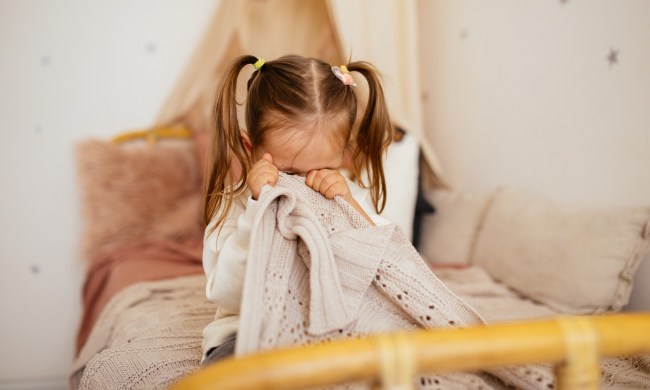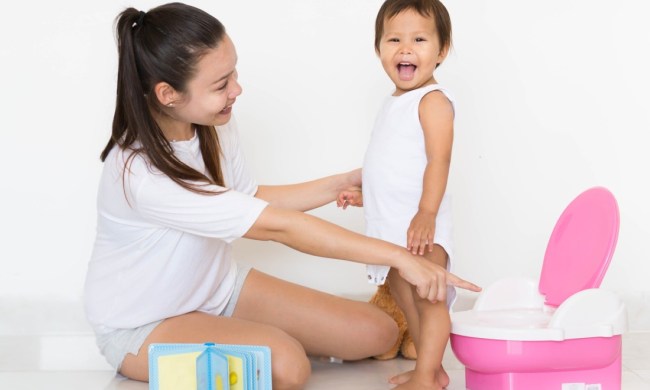Nothing can rouse a parent from a deep sleep like hearing your toddler crying. But what happens when you frantically run to them only to discover they are back asleep? This happens more than you may expect. If your typical happy-go-lucky toddler is suddenly crying out in their sleep, it may make parents worried that something may be wrong. As if toddler behavior isn’t difficult enough to figure out when they’re awake, parents need to know: Why do toddlers cry in their sleep.
The good news is toddlers crying in their sleep is a normal part of their development and doesn’t mean anything is troubling your child. In fact, this behavior has a variety of different causes. Learn some of the reasons why toddlers cry in their sleep and if there’s anything to do to help prevent it, so everyone gets a good night’s sleep.
Your tot’s sleep patterns could be off
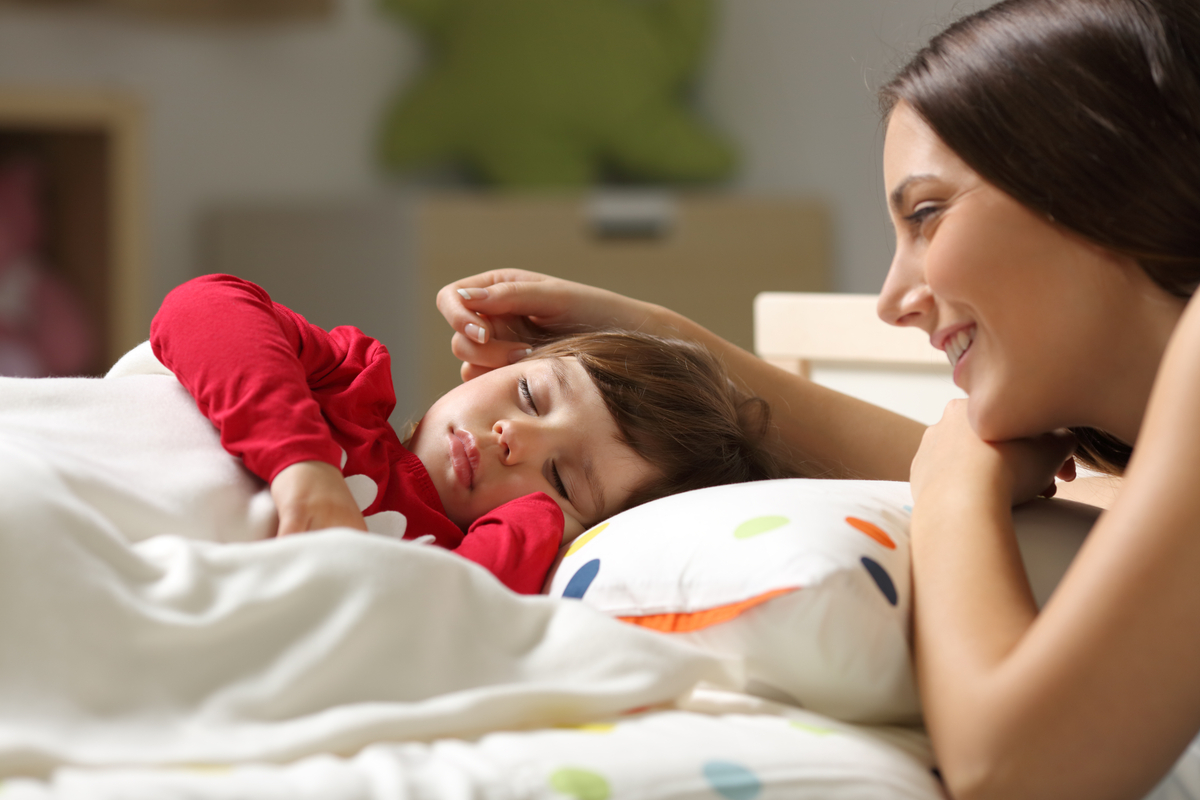
Because babies and toddlers are still growing at a fast rate, they haven’t yet developed a consistent sleep pattern. In some cases, when babies or toddlers cry out in their sleep, it’s simply an indication of them transitioning from one sleep cycle to the next. If this is the case, they will more than likely settle down on their own.
Toddlers crying in their sleep is similar to children talking in their sleep. This is typically nothing to worry about, but being overtired brings it on, so they suggest ensuring there is a consistent bedtime that allows for ample rest. Consistency is key, so try to have their bedtime be the same every night and that they sleep in the same spot.
Nightmares and night terrors make things scary

Sleep specialist Rafael Pelayo, MD, an associate professor of sleep medicine at Stanford University School of Medicine, explained to WebMD that parents may need to consider nightmares or night terrors as the reason for their children crying out in the night.
The first thing you can do is to look for any physical problems that may be disturbing their sleep,” Pelayo suggests to parents who are dealing with this. He goes on to say, “If there doesn’t seem to be anything physical causing them to wake and stir, then it’s time to talk about the nightmares. Tell them that they are always safe and that nightmares and dreams are like paintings and drawings, meaning that they can paint a nice picture or a scary picture.”
Night terrors may be more disturbing for a toddler. “Night or sleep terrors are not nightmares,” Pelayo added. Children will have no memory of a night terror, while they will often remember a nightmare and wake to realize it wasn’t real. KidsHealth writes that toddlers who have experienced night terrors are sometimes overtired, ill, stressed, taking a new medicine, sleeping in a new environment away from home, not getting enough sleep, or having too much caffeine.
If you think your child is experiencing night terrors, experts suggest not trying to wake your child, but simply waiting it out while ensuring their safety. Cadence Education does note sleep regression is common around 2 years of age, so sleep disruptions are often not something to worry about.
The sleeping conditions need to be just right
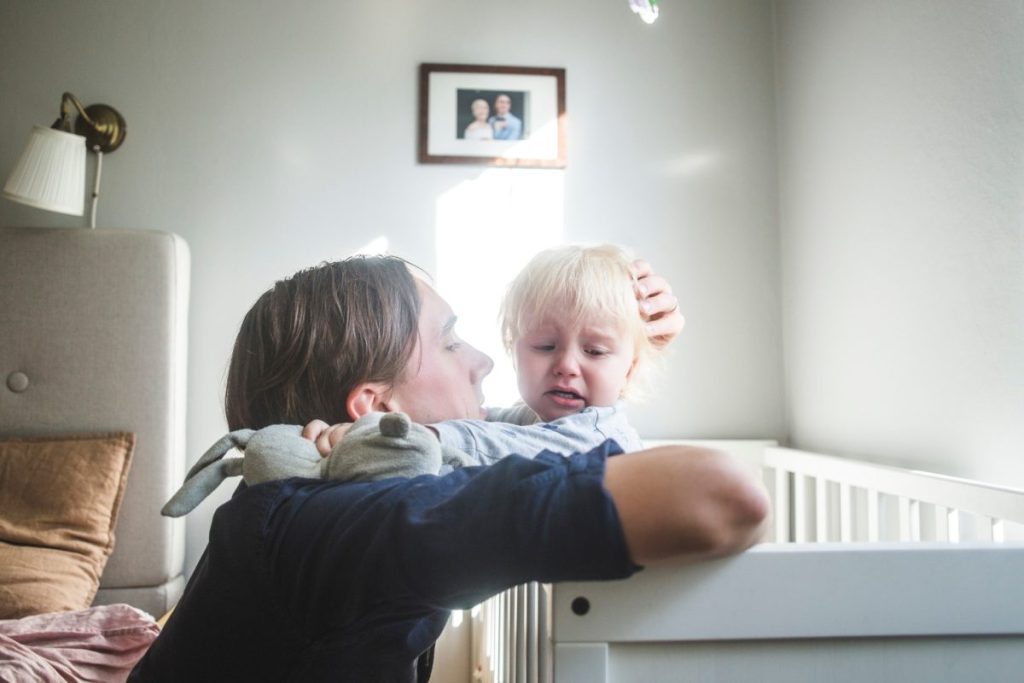
Sometimes toddlers cry in their sleep for any number of reasons, but one is because they are like Goldilocks, and those sleeping conditions need to be just right. We all have our preferences for temperature at night, and toddlers are even pickier.
Being too hot or too cold also does the trick to interrupting their rest. Checking the room temperature and dressing the toddler appropriately may stop them from waking with a fright. Overstimulation also causes a child to cry during sleep, so creating a soothing and calm sleep environment is key.
We all have our quirks to get to sleep and stay asleep. Light off but fan on, but socks off but blanket on. It’s a process. Find your tiny tot’s settings and they should get back to sleeping through the night.
Check your toddler out, tummy to bottom
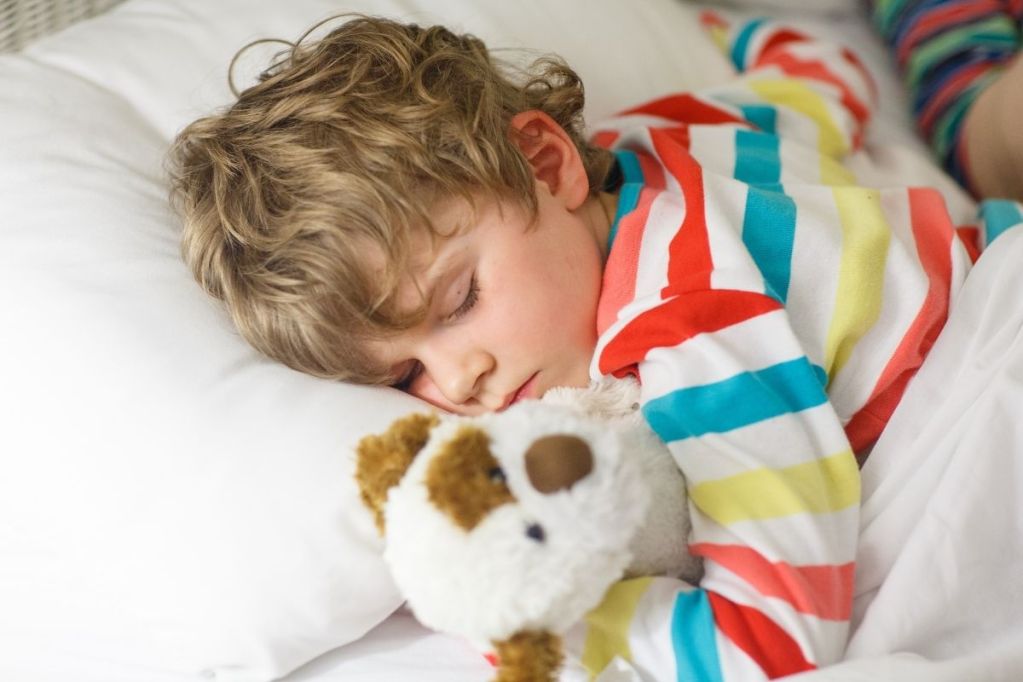
- Are they fed?
- Are they dry?
- Are they going through a growth spurt?
A toddler may cry during the night if they are hungry, which happens if they’re going through a growth spurt or simply decided to not eat much during the day. We aren’t saying have a midnight feast with your toddler, but they need more calories during the day.
The growing pains that come with growth spurts are no joke, and a spasm would wake your toddler up in an instant, and just as quickly stop, sending them right back to sleep. Try gentle massages on their legs and arms before bed to ease their discomfort.
A soiled diaper may also cause a toddler to cry in their sleep, simply out of discomfort. Who wants to sleep in a wet diaper or pullup? A quick change will send your little one right back to bed.
When to worry

Although crying out in their sleep is common among younger children, parents should be concerned if this begins to happen frequently, especially if it is accompanied by other signs of distress, such as difficulty breathing, excessive sweating, or sudden jerking movements. Occasional crying during sleep is normal, particularly in infants and toddlers, as they transition between sleep cycles or experience dreams.
However, persistent or intense crying, especially if the child appears inconsolable upon waking, could indicate underlying issues like night terrors, sleep disorders, teething pain, or even medical conditions such as reflux or ear infections. If the crying is frequent, disrupts sleep regularly, or is paired with other concerning symptoms, parents should consult their doctor or health professional to rule out any serious health concerns.
How to approach the sleepless nights

There is a difference between your tot having a night terror or nightmare and just having a poor sleep schedule. Knowing the difference and making sure you keep tabs on the reasons behind your toddler’s nighttime wakings will help get the house back to quiet.
If they wake up at the same time every night, try waking them up before they scream
If things are happening consistently, make a note of what time your little one wakes up crying, and start waking them up about 15 minutes before then for about a week. It’s like resetting your electronics when they won’t work right.
Look for other symptoms with the crying
Have you noticed your child experiencing jerky movements in their sleep? Excessive or sudden drooling? Does your child’s body go stiff while sleeping? There are other medical conditions that could be the underlying reason why your toddler is crying in the night. Note what else is going on to bring to the pediatrician’s attention.
What parents should keep in mind

It’s all about the night routine and keeping bedtime consistent
If your toddler cries during sleep, you could always check on them to ensure they are safe. If you think your child is experiencing night terrors, they are repeatedly crying out in their sleep, you haven’t been able to determine a cause for it, fear they may be in pain, or the sleep issues are affecting how your tot functions during the day, it may be time to contact your doctor.
Parents want to reinforce healthy sleep habits and establish a healthy sleep routine by eliminating stress before bedtime, having a consistent bedtime routine, and being consistent with how they respond when their child cries. Find a bedtime routine that works, and stick with it. It doesn’t have to be an hour long, or require three stories, but it needs to be the same.
Proper sleep is so important, not only for growing and developing toddlers but for parents who are on the go all day with them. If your toddler cries in their sleep, it’s not usually something to be worried about, but it’s important to know the ins and outs behind the behavior so each parent can react accordingly. And so the whole house gets their beauty rest.


